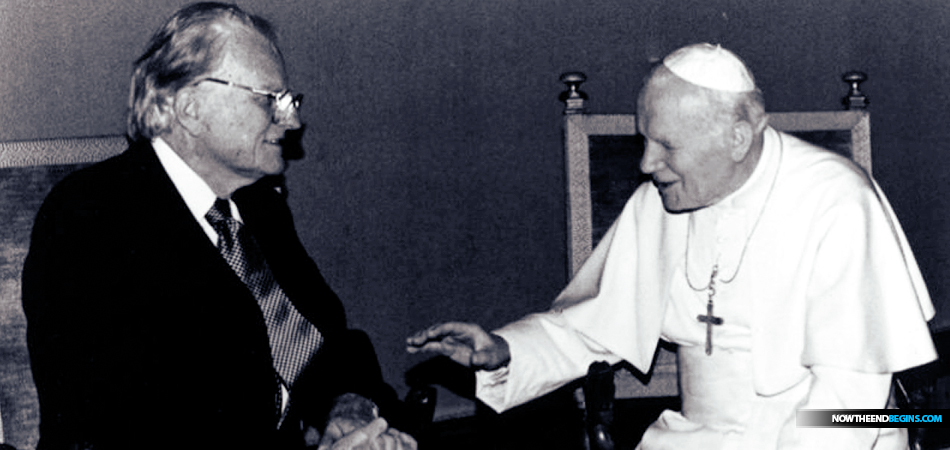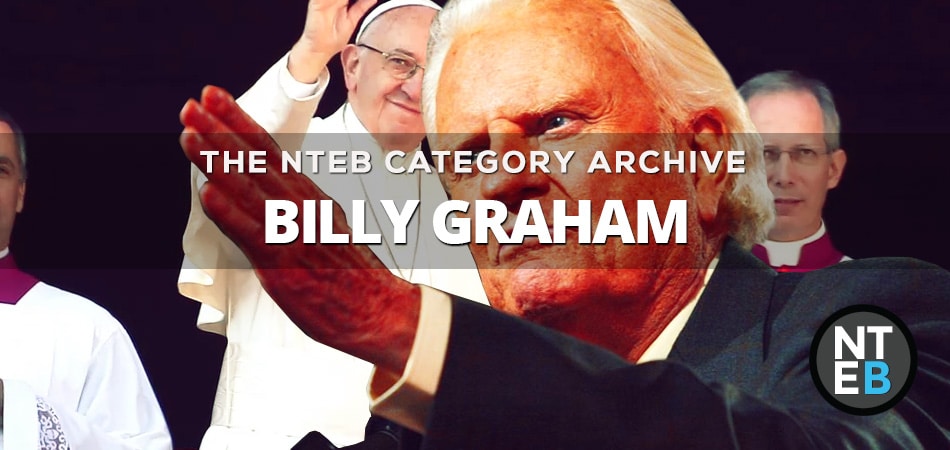
Billy Graham wanted to assess the way political, ideological, and theological world issues affected evangelism, and to bring evangelical leaders to a common vision for both evangelism and social justice.
How Billy Graham started out and how he end up are as far apart from each other as light is from darkness, and it is a cautionary tale to all of us in the ministry here in the 21st century. The Billy Graham of 1947 was an on fire, no holds barred preacher of the gospel of the grace of God, and the Billy Graham of 1974 was seeking to compromise and promote peace at any cost, including the cost of the compromising the of the gospel he claimed to be a minister of.
"And unto the angel of the church of the Laodiceans write; These things saith the Amen, the faithful and true witness, the beginning of the creation of God; I know thy works, that thou art neither cold nor hot: I would thou wert cold or hot. So then because thou art lukewarm, and neither cold nor hot, I will spue thee out of my mouth." Revelation 3:14-16 (KJB)
In 1974, Billy Graham joined forces with social gospel preacher John Stott, at a global meeting they called
The Lausanne Movement. But when you see and understand what grew up in its aftermath, it could just have easily and as accurately been called
The Laodicean Movement, because that's exactly what came next. It is impossible to reconcile the Billy Graham of 1947, who said the quote below, with the Billy Graham of just a few decades later who would be the leader of the ecumenical church movement.
In 1948, Billy Graham was asked: "What do you expect the World Council of Churches (WCC) to do this August when they visit Copenhagen?" He replied: "I believe they are going to nominate the Antichrist!" As early as 1966, however, Graham boasted that he attended the WCC assembly in New Delhi in 1961, and he hoped he would attend the 4th assembly in Uppsala, Sweden in 1968 (which he did). He has attended all but two WCC General Assemblies after that.
As Graham was slowing coming into power over the ecumenical and rapidly apostatizing Christian Church, he was at the same time forming deep connections with the pope and the Vatican that would endure for the rest of his life. Take a look at just a few of the quotes from and about Billy Graham at the time that most people generally associate with him holding massive revivals. I think you can clearly see what type of revivals they really were.
- March 8, 1979- National Enquirer- Regarding the Pope, Billy Graham said, "He'll be warmly greeted because he's such a down-to-earth, fun-loving man who creates friends wherever he goes. I firmly feel Pope John Paul II will be the most respected pope of the century and he'll become the moral leader of the world."
- Billy Graham's comment to US News and World Report, Dec. 19, 1988- "World travel and getting to know clergy of all denominations has helped mold me into an ecumenical being. We're separated by theology..., but all of that means nothing to me any more."
- Rocky Mountain News- July 25, 1987- The editor wrote, "Many Roman Catholics walked the aisles during Graham's 1965 crusade. In the a987 crusade, which ends tomorrow, Catholics were waiting to help Catholics express their new and renewed faith in their Mother Church."
- Letter from Rev. Michael Seed, Ecumenical advisor to Cardinal Hume, London, England, 1989: "Some 2100 Catholics 'went forward' at the Missions evenings in London which was excellent-- from nearly all our Parishes in Westminster... Billy Graham has helped our (Roman Catholic) Church greatly and many have 'renewed' their faith under his great ministry."
The article below credits Billy Graham with 'brokering peace' between the fading fragments of bible preaching Christianity with the then up-and-coming social justice Christianity movement, but he did no such thing. What Graham created was a bastard hybrid end times church that would become the lukewarm Laodicean Church that Jesus spits out of His mouth. Did people get saved during Billy Graham's career? Sure they did, but it was in spite of Graham just as much as it was because of him. The question is not how many got saved under Billy Graham's preaching, the real question is how many souls went to Hell when Graham sent them back to their Roman Catholic churches when they came to his rallies?

WATCH AND LISTEN AS BILLY GRAHAM IN HIS OWN WORDS SHOWS STEADY SLIDE INTO LAODICEAN APOSTASY
How Billy Graham Brokered World Peace Between Evangelism and Social Justice And Created the Laodicean Lukewarm Church
FROM CHRISTIANITY TODAY: In 1974, Billy Graham convened an enormous conference in Lausanne, Switzerland.
“I traveled the whole world meeting such wonderful leaders,” Billy Graham later
told Lausanne global executive director Michael Oh. “But I found that they didn’t know each other.”
Graham wanted to assess the way political, ideological, and theological world issues affected evangelism, and to bring evangelical leaders to a common vision for both evangelism and social justice. He invited about 2,400 evangelical leaders from 150 countries.
The meeting turned out to be outrageously important. Not only did the participants make up “possibly the
widest-ranging meeting of Christians ever held” and signal the rising strength of conservative Christians worldwide, it also delivered unity on the most divisive issue of the day—whether social justice should be as highly prioritized as evangelism.
And it kicked off the Lausanne Movement.
“No one else did as much to turn evangelicalism into an international movement that could stand alongside—and ultimately challenge—both the Vatican and the liberal World Council of Churches for the mantle of global Christian leadership,”
wrote George Washington University professor Melani McAlister for
TheAtlantic. Her forthcoming book is
The Kingdom of God Has No Borders: A Global History of American Evangelicals.
“He used his status as the most important religious figure of the 20th century to help lead American evangelicals into a more robust engagement with the rest of the world,” she wrote.
In some ways, the first Lausanne conference was the culmination of a meeting 20 years earlier, when Graham was first introduced to British evangelist John Stott at Cambridge University. The two became close friends during a mission at the school.
“The first time I visited Billy at his old log home with Leighton [Ford], the very first thing Billy asked me was ‘How’s John?’” remembered Doug Birdsall, honorary co-chair of the Lausanne Movement. “This should not have surprised me because just a year earlier when I first met John Stott in London on Lausanne-related matters, his first question had been, ‘How’s Billy?’”
Stott was
among the small group of leaders Graham gathered in Montreaux, Switzerland, in 1960 to mull over how to unite evangelicals globally. The answer: Gather around
evangelism, the only word that would unite them, Graham decided.
Out of the Montreaux meetings grew the 1966 World Congress on Evangelism, which drew 700 participants, including Stott.
And out of the 1966 Congress grew the Lausanne Congress, organized and
funded almost entirely by the Billy Graham Evangelistic Association. Graham and Stott both spoke, emphasizing the urgency of evangelism and addressing the argument over whether evangelism should be valued more highly than social justice issues.
They did it: Billy Graham as “
the indispensable convener,” and Stott as “the indispensable uniter.” The Lausanne Covenant brokered peace between the two sides (“
we affirm that evangelism and socio-political involvement are both part of our Christian duty”) and gave walking orders for future partnerships in evangelism.
The Congress also gave walking orders to a Continuation Committee, which included both Stott and Graham and met in Mexico City in 1975. There, the Lausanne Movement was fleshed out, with Graham’s brother-in-law Leighton Ford elected as chairman in 1976.
At the same time, Billy Graham was supporting a global outlook at the World Evangelical Alliance (WEA).
READ MORE
How Billy Graham Was Used To Usher In The Lukewarm Laodicean Church Era
Did you know that Billy Graham believed and taught that you could be saved and not know it? That the Body of Christ will include non-Christians from other religions as well as pagans? How about the time he told Larry King on CNN that he feels absolutely comfortable worshipping in a Mormon church? Now before you go and stroke out over what I’m telling you, take a moment to watch the video below and hear all of that and more from Billy’s own lips, at a time when he was still well in possession of all his mental faculties.
No comments:
Post a Comment